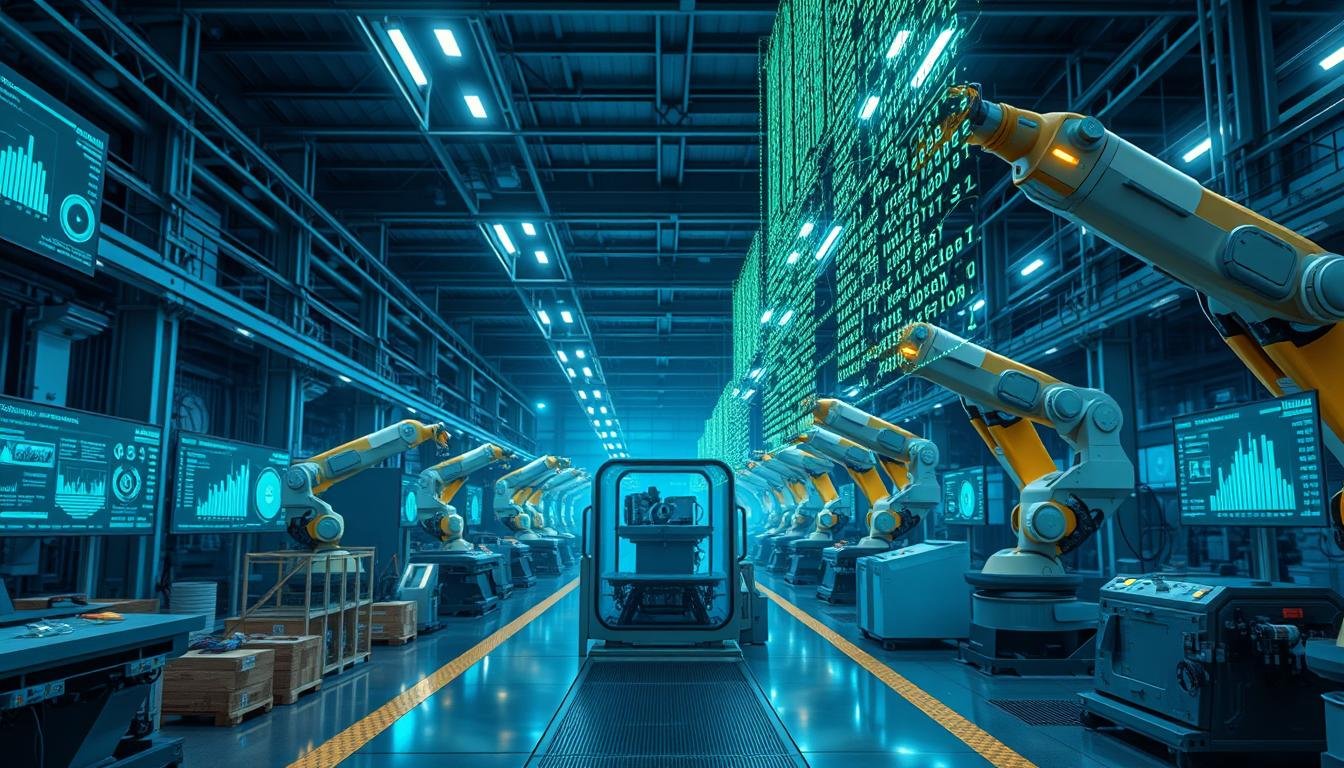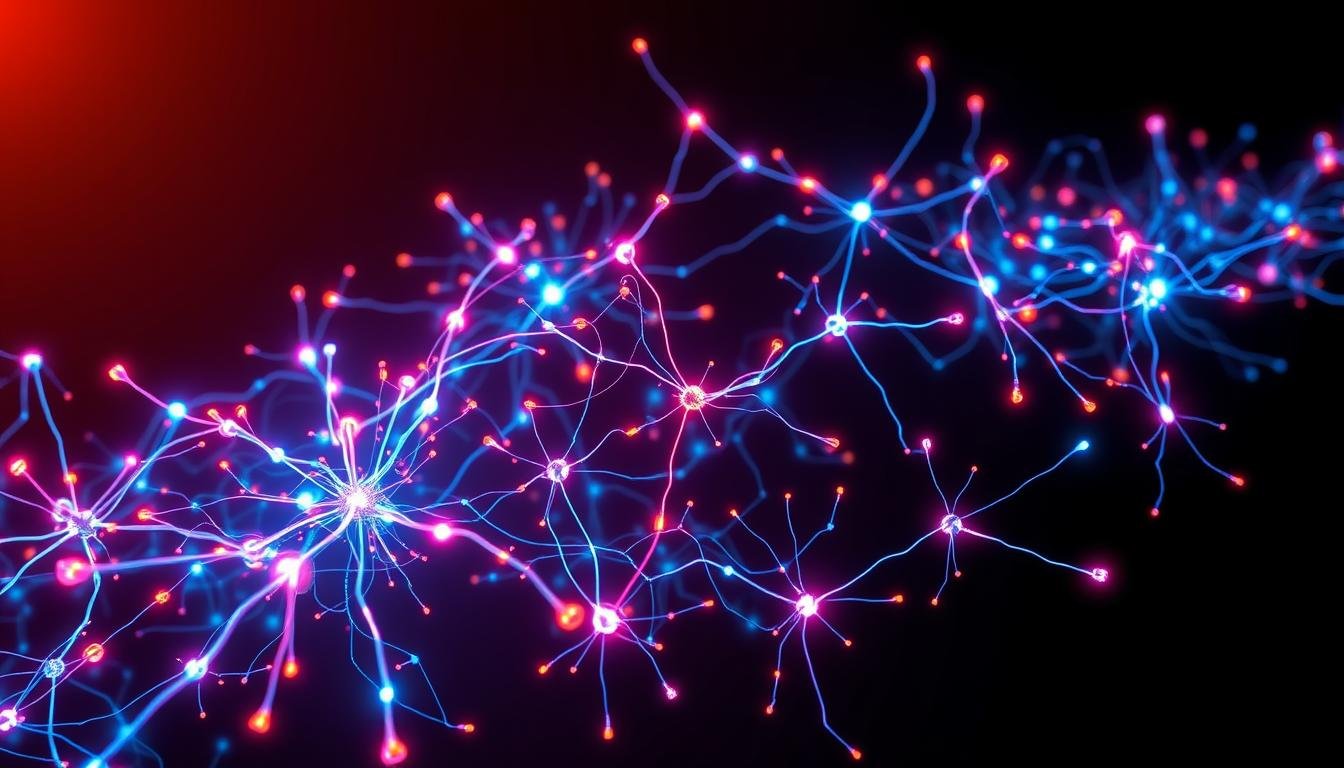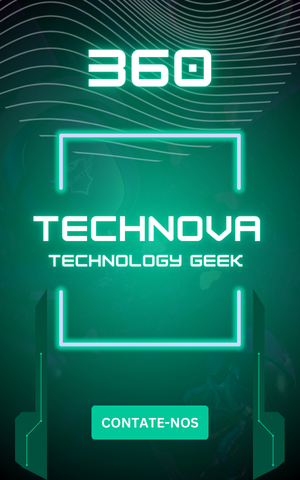Building a high-performance gaming PC is now easier than ever. It’s like putting together IKEA furniture, even if you’re not tech-savvy. This guide will help you choose the right parts for a gaming machine that will take your gaming to the next level.
Creating the perfect gaming PC is all about finding the right balance. You need to pick the best components for performance, compatibility, and value. From the CPU to the GPU, motherboard, and storage, each part is key for a great gaming experience. This guide will be your map to building a top-notch PC that lasts.
Key Takeaways
- Building a high-performance gaming PC has become more accessible, akin to assembling IKEA furniture.
- Carefully selecting the right components is crucial for unlocking the full potential of your gaming system.
- This comprehensive guide covers the essential components, including CPU, GPU, motherboard, RAM, storage, and cooling solutions.
- By following the recommendations and tips provided, you can create a powerful and durable gaming machine that enhances your overall gaming experience.
- The guide also includes advice on planning a build, assembling components with care, and maintaining the PC for longevity and optimal performance.
Choosing the Right CPU for Gaming
Building a top-notch gaming PC starts with picking the right CPU. This key part handles all the calculations and instructions for your games. Whether you pick Intel or AMD, consider several factors to get the best gaming performance for your money.
Intel vs AMD CPUs
Intel and AMD both offer great CPUs for gaming. Intel’s 13th Gen Core i5, i7, and i9 processors excel in single-core performance. This makes them perfect for demanding games. AMD’s Ryzen 5000 and 7000 series CPUs balance gaming power with multi-threaded capabilities, meeting various gaming and productivity needs.
Factors to Consider: Cores, Threads, and Clock Speed
- Cores: A CPU’s core count affects its ability to handle tasks at once. For gaming, aim for at least 6 cores, with 8 or more for the best performance.
- Threads: Each core can manage multiple threads, enhancing the CPU’s multitasking abilities. For smooth gaming, choose a CPU with at least 12 threads.
- Clock Speed: Clock speed, in GHz, shows a core’s processing power. Higher speeds mean better single-core performance, key for gaming. Look for CPUs with 4GHz or higher for top gaming results.
By focusing on these key factors, you can pick the ideal cpu for gaming that fits your needs and budget. Whether you choose intel vs amd cpus, aim for a gaming cpu with the right cpu cores, cpu threads, and cpu clock speed for a flawless gaming experience.
Selecting the Perfect GPU for Smooth Gameplay
The graphics processing unit (GPU) is key for a top gaming PC. It makes games look amazing and run smoothly. When picking between NVIDIA and AMD GPUs, think about ray tracing, power use, and what resolutions and frame rates they support.
NVIDIA vs AMD GPUs
NVIDIA’s GeForce RTX 40-series and AMD’s Radeon RX 7000-series are top choices for gaming. They have the latest tech for great visuals and smooth play. NVIDIA’s RTX series has ray tracing for better lighting, while AMD’s FSR boosts performance without AI.
Nvidia’s DLSS 3.0 and AMD’s FSR 2 and 3 use AI and upscaling to improve frame rates. Over 440 games support DLSS, and 201 use AMD’s FSR. These techs help gamers get the best experience.
Matching GPU to Monitor Resolution
Choosing the right GPU is key for a great gaming experience. For 1080p, a mid-range GPU like the NVIDIA GeForce RTX 4070 or AMD Radeon RX 7800 XT works well. For 1440p, go for a stronger GPU like the RTX 4080 or Radeon RX 7900 XT.
For the best 4K gaming, pick the top GPUs like the RTX 4090 or Radeon RX 7900 XTX. No matter your resolution, there’s a GPU for every budget and need. Whether you’re casual or serious, the right GPU will take your gaming to the next level.
The Motherboard: The Foundation of Your Gaming Rig
Building a top-notch gaming PC starts with the motherboard. It connects all key parts together. Choosing the right one is key for smooth communication between your CPU, GPU, memory, and more. The motherboard’s features greatly affect your system’s performance and future upgrades.
When picking a motherboard, consider the form factor. You have options like ATX, mATX, and ITX. The size and number of slots depend on it. Also, make sure it fits with your CPU, whether it’s Intel or AMD.
- Look for advanced features like PCIe 4.0/5.0 support and fast storage options. Robust power delivery is also important for future upgrades and overclocking.
- Check the RAM slots, memory speed, and capacity. This ensures your system can handle today’s games and content creation.
- Consider the USB ports, networking options, and other connectivity features. They should meet your specific needs.
Choosing the right motherboard for gaming PC is crucial. It helps build a stable, reliable, and future-proof gaming rig. This rig will meet your growing gaming pc motherboard features and performance needs.
| Motherboard Feature | Benefit for Gaming PC |
|---|---|
| PCIe 4.0/5.0 Support | Enables faster data transfer speeds for high-end GPUs and M.2 SSDs, improving overall system performance. |
| Multiple M.2 Slots | Allows for the installation of multiple ultra-fast solid-state drives, providing ample storage capacity and lightning-fast loading times. |
| Robust Power Delivery | Ensures stable and reliable power supply to the CPU and GPU, enabling overclocking and maximizing system potential. |
By carefully selecting the right motherboard for gaming PC, you can build a stable, reliable, and future-proof gaming rig. It will meet your growing gaming pc motherboard features and performance needs.
How to Build a High-Performance PC for Gaming: Essential Components and Tips
Building a high-performance gaming PC is exciting and rewarding. By choosing the right components, you can make a gaming rig that’s top-notch. I’ll show you the key parts and share tips to build your dream gaming PC.
Selecting the Right CPU
The CPU is the heart of your gaming PC. Intel and AMD offer great options. The Intel Core i9 and AMD Ryzen 9 series are perfect for gaming. They have fast speeds and many cores for smooth gameplay.
Choosing the Perfect GPU
The GPU is key for gaming. NVIDIA’s GeForce RTX and AMD’s Radeon RX series are top choices. The GeForce GTX 1650 is a great pick for its performance and value.
Investing in a Reliable Motherboard
The motherboard is your PC’s foundation. Choose a high-quality one. Asus’ X670E-E ROG STRIX Gaming Wifi and Z790-F ROG STRIX Gaming Wifi are great options.
Maximizing RAM for Smooth Gameplay
RAM is crucial for a smooth gaming PC. Aim for at least 16GB. Corsair’s Dominator Titanium DDR5 series is reliable and fast, especially for Intel systems.
Optimizing Storage Solutions
Use fast SSDs and big HDDs for your gaming PC. Samsung’s 990 Pro SSDs are reliable and fast. They come in 2TB and 4TB sizes for lots of storage.
Powering Your Gaming Rig
A good PSU is key for your gaming PC. Look for an 80 Plus Gold-certified PSU from brands like Corsair, Seasonic, and EVGA. The Corsair RMx RM1000w and Seasonic Prime TX-1300 80 Plus Titanium series are top choices.
Cooling Solutions for High-Performance
Good cooling is vital for your PC’s performance and life. A 360mm AIO liquid cooler from Corsair or NZXT is great for cooling your CPU. The Corsair iCUE LINK H150i LCD Liquid Cooler and the NZXT Kraken 360 Elite are excellent choices.
By following these tips and choosing the right parts, you can build a top-notch gaming PC. The cost can range from £585 for a budget option to £870 for a premium build.
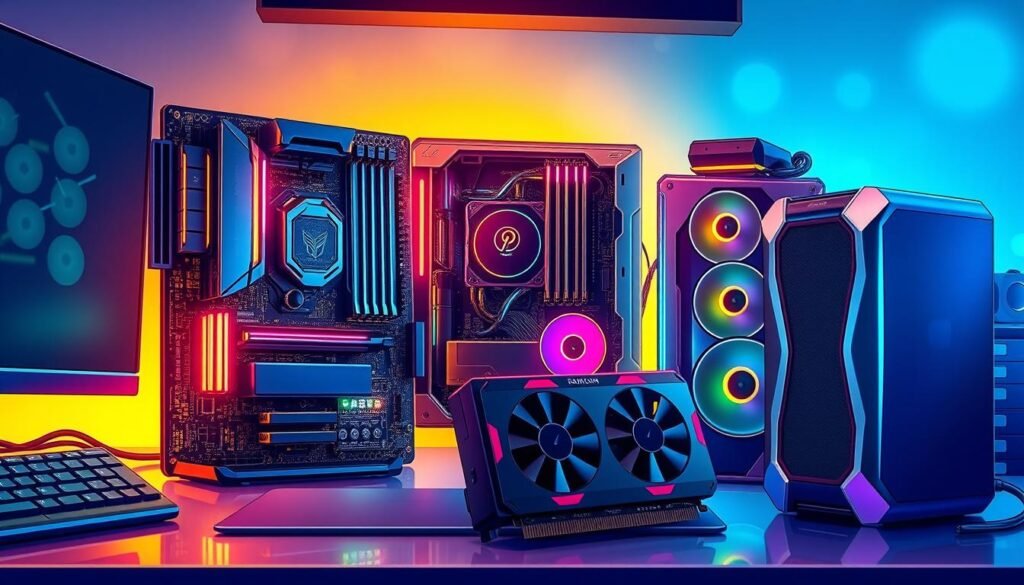
RAM: Maximizing Speed and Capacity
Building a top-notch gaming PC starts with picking the right RAM. RAM is key for your CPU and GPU to work well. It affects how fast your games run. Knowing DDR4 vs DDR5 and single vs dual-channel RAM is important for your gaming PC’s performance.
DDR4 vs. DDR5 Memory
DDR4 has been the norm for years, offering good value and performance. But DDR5 brings even faster speeds and more bandwidth. If you can afford DDR5, it might give you a big boost in game performance. Check out DDR4 and DDR5 options and see what fits your system best.
Dual-Channel vs. Single-Channel RAM
Memory setup is also crucial. Dual-channel RAM, where you pair RAM modules, can greatly improve performance. It lets your CPU access memory better, leading to smoother games. Make sure your RAM is set up on your motherboard for dual-channel benefits.
To build a top gaming PC, balance RAM speed and capacity. Understanding DDR4 vs DDR5 and dual-channel vs single-channel RAM helps. This way, you can choose what’s best for your gaming needs.
Storage Solutions: Fast SSDs and Spacious HDDs
Building a top-notch gaming PC means focusing on storage. Solid-state drives (SSDs), especially NVMe M.2, are super fast. They make your PC start up and games load quickly. For the best performance, you need these SSDs.
Hard disk drives (HDDs) are great for storing lots of data. Use a fast SSD for your OS and main games. Then, a big HDD for media and more games. This mix makes your PC efficient and balanced.
Choosing the right storage is key. A 500GB SSD is perfect for your OS and top games. A 4TB HDD holds your growing game collection and media. This setup ensures your PC can handle all your needs.
When picking SSDs, go for brands like Samsung, WD, SanDisk, and Kingston. They offer top-notch options. For HDDs, look for big capacity and reliability. This balance makes your PC ready for anything.
“SSDs can be 10 times faster than SATA drives, and the latest Gen5 technology can make NVMe drives 22 times faster than SATA drives, delivering lightning-fast performance for your gaming PC.”
Storage isn’t just about how much you can store. It’s about speed, efficiency, and reliability. With the right SSD and HDD mix, your gaming PC will be unbeatable.
Power Supply Unit: Reliability and Efficiency
The power supply unit (PSU) is key in any gaming PC. It makes sure all parts get the power they need. Choosing a good PSU is vital for your system to run smoothly and safely.
Calculating Power Requirements
To find the right PSU wattage, add up your system’s power needs. This includes the CPU, GPU, and storage drives. Mid-range systems usually need 500W to 650W. High-end systems might need 750W to 850W. For top performance, consider a 1000W or more.
It’s wise to pick a PSU with a bit more power than you think you’ll need. Aim for 20-30% more. This way, your PSU can handle future upgrades without trouble.
Modular vs. Non-Modular PSUs
When picking a PSU, decide between modular and non-modular designs. Modular PSUs have removable cables for better cable management. Non-modular PSUs have fixed cables, making cable management harder but cheaper.
For a tidy build, go for a modular PSU. But, if you’re okay with some effort, a non-modular PSU can work too.
| Comparison | Modular PSU | Non-Modular PSU |
|---|---|---|
| Cable Management | Easier to route and hide cables | More challenging cable management |
| Cost | Typically more expensive | Generally more affordable |
| Flexibility | Allows for customization and only using the cables needed | Limited flexibility as all cables are permanently attached |
The choice between modular and non-modular PSUs depends on your build needs and budget. A good power supply for gaming pc is crucial for performance.
Cooling Solutions: Keeping Your Components Chilled
Keeping your gaming PC cool is key for its long life and smooth performance. You have two main choices: air cooling and liquid cooling.
Air Cooling vs. Liquid Cooling
Air cooling uses big heatsinks and fans. It’s easy to set up and won’t break the bank. But, it might not handle the heat of top-notch components well.
Liquid cooling, on the other hand, uses liquid to move heat away from your PC. It keeps your components cooler, especially if you’re overclocking. This makes it a top pick for serious gamers.
Choosing between air and liquid cooling depends on your budget, what you’re cooling, and your build’s look. Both have their perks, and the best one for you will match your specific needs.
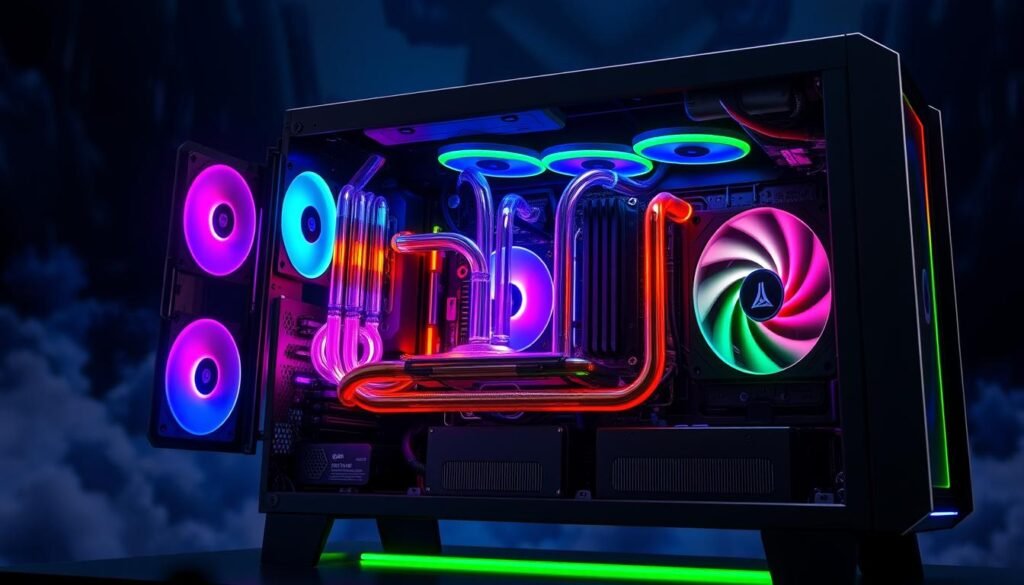
“Effective cooling is essential for maintaining the stability and longevity of your high-performance gaming PC.”
| Air Cooling | Liquid Cooling |
|---|---|
| Affordable and straightforward | Superior cooling performance |
| Relies on air circulation | Closed-loop liquid circulation |
| Suitable for budget-conscious builds | Preferred for high-end, overclocked components |
Choosing the Right PC Case
The pc case you pick is key for your gaming PC’s look, airflow, and parts fit. Whether you want a small mini-ITX or a big full-tower, think about size and shape. This choice greatly affects your PC’s performance and looks.
Form Factors and Size Considerations
Size and shape matter a lot in gaming pc cases. Mini-ITX cases are small, perfect for portability but limited in space. Micro-ATX cases are a bit bigger, offering more room but still compact. Most gamers choose ATX mid-tower cases for their balance of size and compatibility.
At the other end, full-tower cases offer lots of room for cooling, multiple GPUs, and more. No matter the size, good airflow and cable management are vital. Look for cases with smart vents, cable systems, and cooling options that fit your needs.
“The right pc case can elevate your gaming experience by providing ample space, excellent cooling, and a visually stunning design.”
When picking a case, think about your GPU and CPU cooler’s size. Make sure your case fits your components well to avoid build problems.
The best case balances looks and function, meeting your gaming PC needs. By focusing on size, cooling, and style, you’ll get a PC that’s both powerful and beautiful.
Essential Peripherals for an Immersive Gaming Experience
Choosing the right peripherals can make a big difference in your gaming experience. From the display to the input devices, each part is key to a great gaming setup.
A high-refresh-rate gaming monitor is crucial for smooth gameplay. Look for monitors with 144Hz or 240Hz refresh rates. These offer seamless motion and less lag. Pair it with a strong graphics card for stunning visuals.
The gaming keyboard and mouse are vital for precise control. Choose mechanical keyboards and gaming mice with advanced sensors. They improve your gaming speed and accuracy.
A quality gaming headset is essential for immersive audio. Look for headsets with surround sound and clear microphones. They enhance your communication and game experience.
For a truly immersive experience, consider virtual reality (VR) gaming gear. VR headsets like the Oculus Rift or HTC Vive bring games to life. They offer realism and engagement beyond traditional displays.
When picking your peripherals, consider resolution, refresh rate, and key switch type. Also, look at sensor performance and audio quality. The right components create a visually stunning and immersive gaming setup.
| Peripheral | Recommended Specifications | Approximate Price Range |
|---|---|---|
| Gaming Monitor | 144Hz or 240Hz refresh rate, 1080p or 1440p resolution | $516 – $1400 |
| Gaming Keyboard | Mechanical switches, programmable keys, RGB lighting | $135 – $180 |
| Gaming Mouse | High DPI sensor, customizable buttons, ergonomic design | $43 – $130 |
| Gaming Headset | Surround sound, noise-canceling, clear microphone | $40 – $150 |
| VR Headset | High resolution, low latency, advanced positional tracking | $900 – $1300 (for gaming laptop with VR capability) |
By choosing the right peripherals, you can enhance your gaming experience. A well-set-up gaming station boosts your immersion and performance.
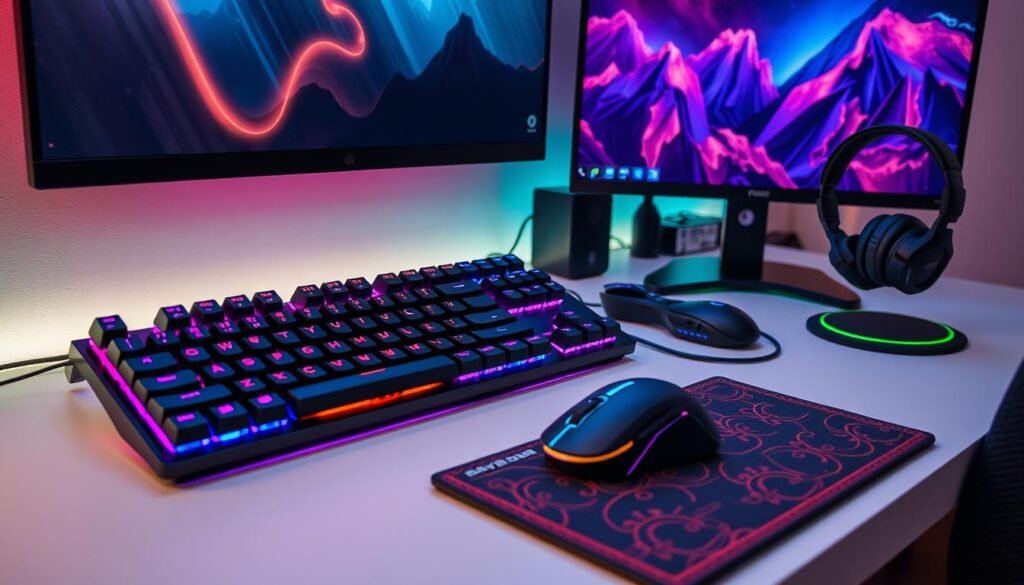
Tips for Building and Optimizing Your Gaming PC
Building a top-notch gaming PC needs careful attention to detail. This includes good cable management and ensuring the case has the best airflow. Keeping cables tidy not only makes your build look better but also helps with cooling. This is key for keeping your PC cool and running smoothly.
Use your case’s cable management tools like channels and clips to keep things neat. Also, think about where and how you place your fans. This helps push air through the system, keeping it cool and efficient.
Cable Management and Airflow
Good cable management is crucial for your PC’s airflow and cooling. By organizing cables well, you help air flow freely. This is important for keeping your components at the right temperature.
Use your case’s cable management features to keep things tidy. This makes your build look great and helps it run cooler. A clean, organized interior is key for a well-cooled system.
Overclocking and Performance Tuning
For those who want the best from their PC, overclocking can be a good choice. It can make your games run faster. But, it’s important to do it carefully to avoid damage.
When overclocking, make sure you have enough cooling and watch your temperatures. Use good software and guides to help you overclock safely. You can also tweak in-game settings and update drivers to get even better performance.
By focusing on cable management, airflow, and overclocking wisely, you can make your gaming PC run at its best. Enjoy fast, smooth gaming with these tips.
| Tip | Description |
|---|---|
| Windows 11 Game Mode | Disables unnecessary background processes to potentially boost framerates while gaming. |
| Do Not Disturb Mode | Automatically turns off Windows notifications during gameplay to minimize distractions. |
| Hardware-Accelerated GPU Scheduling | Allows dedicated video cards to schedule and render frames, potentially improving gaming performance. |
| Prioritize Speed in Windows UI | Adjusting Windows settings to prioritize speed can enhance overall system performance. |
| Disable Enhanced Pointer Precision | Optimizes gaming mouse accuracy by disabling Windows’ enhanced pointer precision feature. |
“Proper cable management and airflow optimization are essential for building a high-performance gaming PC that runs cool and efficient.”
Conclusion
Building a top-notch gaming PC needs careful picking of parts and detail in assembly. This guide helps you make a powerful, custom gaming machine. It ensures a great gaming experience. You’ll learn about choosing the best CPU, GPU, and motherboard.
Each part is key to your PC’s performance. You’ll also find tips on cooling and power solutions. These are crucial for your gaming PC’s success.
With the right steps and patience, your gaming setup will reach its full potential. Use tools like PC Part Picker and Reddit for help. They’re great for building the ultimate gaming PC, whether on a budget or for enthusiasts.
Investing time in planning and building your gaming PC pays off. You’ll get a machine ready for demanding games. It will offer an unmatched gaming experience.
So, dive into the process, get hands-on, and start building your dream gaming rig. It will amaze you for years.



